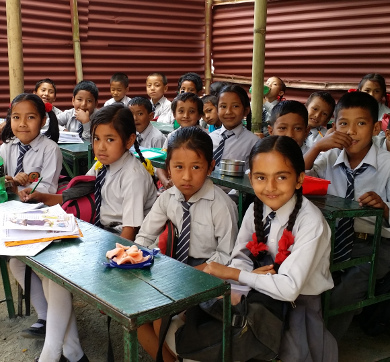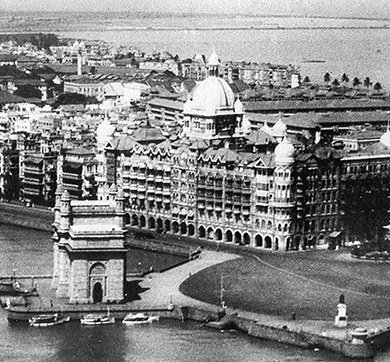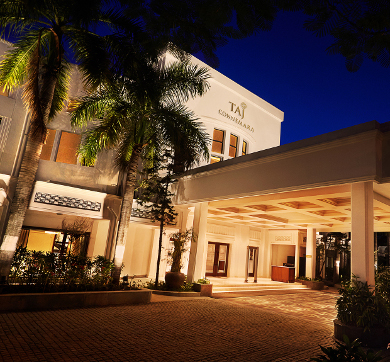December 2018 | 2337 words | 9-minute read
"He has the kindest eyes… And the reassurance that he gave us was not just some promise. He was true to his words.”
“He is like an angel, to tell you the truth… He has changed so many lives, not just mine.”
“The man did not have to stand outside the burning building worrying for his people. But he did. He did not have to visit hospitals to reassure people like Manoj Thakur, a hawker injured outside Leopold Cafe in the terrorist attack of 26/11 and promise him that everything would be all right. But he did.”
“I was too dazed to understand what was going on. It is because of Mr Ratan Tata that my life has dignity.”
I am looking into two pairs of bright eyes that belong to Sunu Verghese and Agnes Martis, who lost their husbands in the horrific events at the Taj Mahal Palace Hotel in Mumbai 10 years ago.
Martis’s husband Faustine and daughter Priya were both in the hotel during the attack. “My husband said on the phone that ‘we’ will come back,” Martis says. “He went in back for our daughter who had just started her career and was still inside [Priya made it out]. I am proud of him.”
Verghese’s husband Thomas, the senior waiter at Wasabi and a 30-year Taj veteran, had first protected his 50-odd guests by directing them to crouch under tables, and asking the employees to form a human shield around them. Later, asked by the security personnel if he could help evacuate the restaurant, Thomas managed to get the guests and staff out through a safe staircase, insisting that he would be the last to leave. He was gunned down as he reached the bottom of the stairs.
Both Martis and Verghese have emerged from their personal tragedies to help run the Taj Public Service Welfare Trust and help others affected similarly.

The Trust
Formed by Mr Ratan Tata, then Chairman of Tata Sons, and Mr RK Krishna Kumar, then vice chairman of Indian Hotels Company Ltd (IHCL), in December 2008, in just two weeks of the end of the siege, to not only provide relief to those affected by the terrorist acts, but also to set up a system to help and rehabilitate those recovering from such tragic events in the future.
Puneet Chatwal, MD and CEO, IHCL, who is on the board of the trust, says, “This trust has now been in existence for 10 years. It is not just for the employees of Taj, but for any body who was impacted by the attacks on Mumbai. We tried to re-establish families and most of them, I would say, have done well under the circumstances. The trust continues to help out people in need.”
Any Indian citizen who has suffered injury due to a terror attack, war, bomb blasts and/or natural disaster in India can apply to the trust for financial, medical, educational or welfare assistance. The word inclusion comes up again and again in the conversation with Verghese and Martis.
The two, in their own words, were “ordinary housewives”, with no experience beyond managing their homes. Martis says she was so sheltered that she did not even know how to travel by public transport.
Verghese adds, “Mr HN Srinivas (then senior vice president, human resources, IHCL) had asked me what I was going to do. When I said I was going to, perhaps, spend time helping mentally challenged children in their homes, he had said then you must join us instead. The offer was so simple, and I knew they would make sure both Agnes and I would be made to feel welcome.”
She adds, “My family may have helped me, but I have never needed to ask for any help. I had Ratan Tata sir, who showed me what real family can do. I cannot forget that joy, that satisfaction which came with the first honorarium.”
It is amazing to see their transformation to confident women who shoulder the responsibility of running a welfare trust, checking new cases and following up with those who have received help via the trust — be it medical or help for their children’s education, skill training or counselling.
“We also train the new joinees, and that includes writing reports,” beams Verghese, who hasn’t forgotten that she learned to write reports from her older son.
The pain does not go away though, because it involves milestones and intimate events like birthdays, anniversaries and weddings of children — Martis’s son got married in December 2018; Verghese’s younger son, who received help from Mr Tata to study at a hotel management institute, will be completing his master’s degree from Le Cordon Bleu Australia in February. But the resolve and the determination to respond to tragedy by creating something beautiful for others is a rare thing that needs to be treasured.
“Our lives changed because we were given an opportunity to turn our fortunes around. We want to go beyond our personal stories and help others,” they say.
Rebuilding lives
Apart from a significant monetary compensation for the family of every Taj employee who died in the 26/11 attack, the settlement included full last salary for life for the family / dependents, complete responsibility of education of children and dependents — anywhere in the world, full medical facility for the whole family and dependents for rest of their life and counsellor for life for each person. All loans and advances — irrespective of the amount — were waived off.
Relief and assistance was also provided to all those who were injured and the families of all those who were killed, including railway employees, police staff, pedestrians and vendors. Apart from monetary compensation and hospital aid, the aid included the establishment of a psychiatric cell to counsel those who needed help.
The group even took responsibility of the education of 46 children of the victims of the terror attack.
More Than Money
Shyam Sundar Choudhary worked at a factory when the taxi bomb of 26/11 ripped through his life. Paralysed from the impact of the bomb, he felt there was no hope left till Verghese and Martis showed up at his doorstep and helped him stand on his own feet again, with training. Learning new skill sets with help from the trust meant more than money; it took him farther than any money anyone could have offered.
Manoj Thakur, the hawker Mr Tata visited in the hospital, was offered a chance to train at TajLands End in Mumbai and offered a waiter’s job at the Taj President. Even Martis’s daughter Priya studied MBA with the trust’s aid and is now employed with the Taj hotel in Dubai.
Verghese says the skill training the trust offers is more valuable, because it sets lives back on track. She speaks from her own experience: “Initially, people from the Tata Institute of Social Sciences would accompany us on field trips. We learnt how to talk to the people, how to assess… Everything. Now we can do this ourselves.”
Tajness At Work
There is Tajness at play even here, they assert. It is a culture of tradition and perfection, a legacy of service that is matchless. It translates into service that goes above and beyond.
Sunil Kudyadi, the head of security, has noticed that a guest had dropped money when talking to me and instructs a server to run after the “tall” man who has just reached the revolving doors at the hotel. “I was just doing my job. I did not realise that it was 60 hours,” he says returning to the memories of the siege.
Sixty hours that changed the way we look at security everywhere we go today. It was the worst terror attack that Mumbai has seen, and he was there showing the way first to the cops and then to the commandos. He was unarmed but had the advantage of knowing the hotel inside out.
“It is only foolish people who will tell you that they were not afraid. Fear keeps you on your toes,” Kudyadi says.
And they had plenty to fear. The terrorists were shooting, lobbying grenades, setting fires. “They hid under dead bodies and more than a couple of times tried to kill us when the National Security Guard (NSG) and Marine Commandos (MARCO) came in,” he adds. “The terrorists were trained, but they were not expecting us to retaliate.”
Their shoes were soaked in blood, and Kudyadi recalls moving barefoot, seeking out survivors. He credits an unsung hero — Anuj, one of the MARCOs, who moved with Kudyadi to rescue a chef trapped in one of the upper floors. Anuj fought the bloodiest battle in that war zone, pushing the terrorists away from the rooms where over 125 guests, including South Korean parliamentarians, were hiding.
Kudyadi, who was later awarded the Jeevan Raksha Padak for his bravery by the President of India, missed a bullet because a MARCO pulled him out of its way.
Among the Taj employees who won the honour, an offshoot of the Ashok Chakra gallantry awards, was Mallika Jagad, then a young banquet executive whose quick thinking and fearlessness saved a global board member of Unilever.
Jagad, now a project manager at the Tata Trusts, says, “For the first few hours, I was absolutely shaken as was everybody. I was terrified. You could hear grenades being thrown, the chandeliers were shaking, there was dust falling…
[Later], I remember that I went to the fifth and sixth floors and everything was shattered. It was burnt down, and I cried…After a few hours, something settled. I was able to calm myself down. Then I had this very strong feeling that everything is going to be okay.”
A lot of the confidence that employees like Jagad and Kudyadi felt after the siege had to do with Mr Tata himself.
“He was standing out there for three days. He had to be moved away to a safer distance,” Kudyadi says. “After the whole thing was over, I met him at the back, when he was feeding stray dogs who were very distressed. He thanked me, and I was amazed at his determination, and moral strength to stay through the event.”
The Tajness phenomenon was so unique that a Harvard case study attempted to understand it. What prompted the hotel’s staff to form a human chain to shield the guests while the terrorists opened fire at them? What made the telephone operators come back to help contact the guests and guide them on what to do and what not to? What superhuman quality drove the off-duty security staff from all the Taj properties to enter the hellish place in order to save lives?
What is this grace under fire? Where can this be found? Can this be learned?
“During the onslaught on the Taj Mahal Palace Hotel in Mumbai, 31 people died and 28 were hurt, but the hotel received only praise the day after,” Professor Rohit Deshpande - Sebastian S Kresge professor of Marketing at Harvard Business School (HBS) and Anjali Raina, executive director of the HBS India Research Center, said in their report.
Their study showed that the actions taken by the Taj employees had not been prescribed in manuals: “Guests were overwhelmed by the employees’ dedication to duty, their desire to protect guests without regard to personal safety, and their quick thinking… As many as 11 Taj Mumbai employees — a third of the hotel’s casualties — laid down their lives while helping between 1,200 and 1,500 guests escape.”
What created this “extreme customer-centric culture of employees staying back to rescue guests” instead of saving themselves and how can other organisations emulate this level of service and dedication is one of the questions raised in the report.
Moving On
Kudyadi, who has been with the Taj for 25 years, says the company is like family, and everyone who worked there then is mostly still a part of the group. “Yes, some moved away for other reasons, or chose to be transferred from here, but we are still here. Proud to be of service.”
But he is still not over the deaths — of his colleagues, his guests and a young boy who was supposed to start school soon. He remembers the attested certificate for the little boy in his suit pocket clearly. “These deaths don’t make any sense. But we saved so many.”
Kudyadi tries to sound matter of fact, but there is something in his voice that grabs you by the throat. “What was distressing was that I spent more time in courts and being questioned than I did trying to do my job,” he says referring to the hotel being sued by some guests after the attack. “There are many people who view the event differently; we just know what we did was right, and eventually the lawsuits went away.”
He adds, “Subsequently, we went abroad for tactical training and came back after learning so much more. Sometimes I wonder about alternative scenarios, what if or what could have been done differently. But at that time, when grenades are being lobbed at you, you do the best you can do.”
Like the resident manager, who ensured everyone had fresh shoes — a seemingly simple thing that made their task much easier. “This can happen only because we are at the Taj,” Kudyadi says.
As victims of the 26/11 attacks still try to cope and move on — often aided by the Taj Public Service Welfare Trust — Mr Chatwal says, “Our Chairman Emeritus Mr Ratan Tata said (at the reopening of the hotel less than a month after the attack), ‘We can be hurt, but we cannot be knocked down.’ This message was so powerful that it has got inculcated in all of us and we try to live by that message every day in whatever we do.”
Contribute to Taj Public Welfare Trust in their relief work during Covid-19 here. Updated April 2020.








